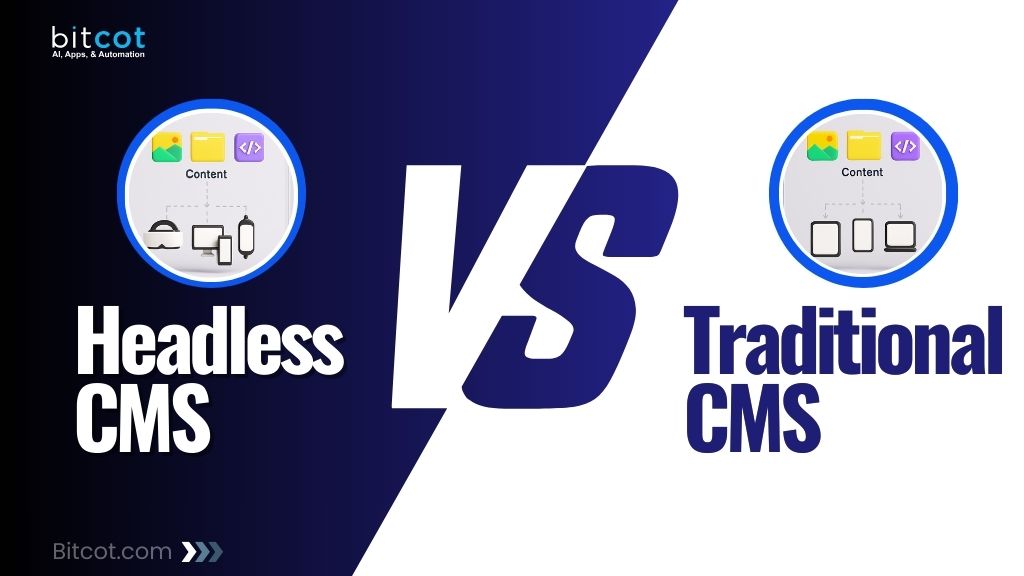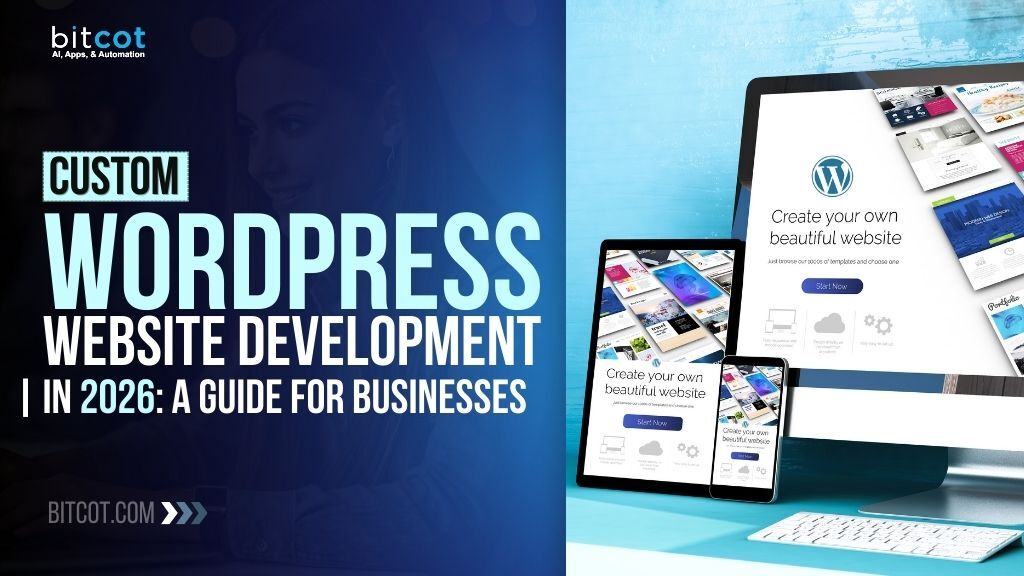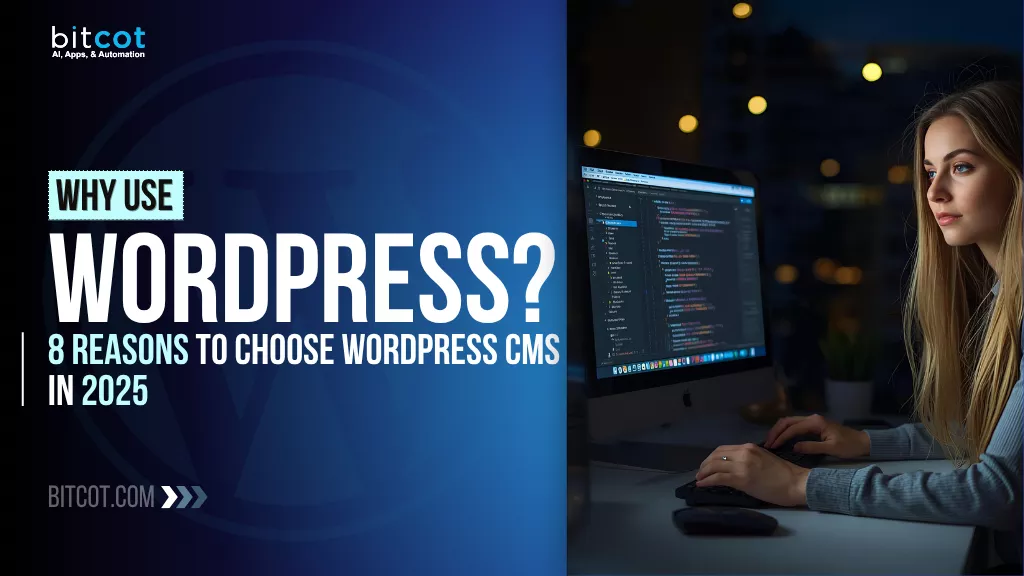
If you’ve ever searched for the best way to build a website, chances are WordPress popped up more than once, and for good reason. It’s not just a familiar name from the early 2000s; it’s still the world’s most-used content management system in 2025.
In fact, WordPress powers over 43% of all websites on the internet, from personal blogs to major brand platforms. That kind of dominance isn’t accidental; it’s proof that the platform continues to evolve with the needs of modern users.
So why, after nearly two decades, is WordPress still the go-to choice for businesses, creators, startups, and enterprises alike?
The answer goes beyond nostalgia or habit. WordPress continues to stay relevant because it combines flexibility, ease of use, scalability, and a massive ecosystem of plugins and themes that keep it future-ready.
Whether you’re launching your first website or upgrading an existing one, understanding why WordPress still leads the CMS world in 2025 will help you make a smarter decision.
Let’s break down the top reasons it remains the favorite choice for millions.
What Is WordPress CMS and Why It’s Still Relevant in 2025
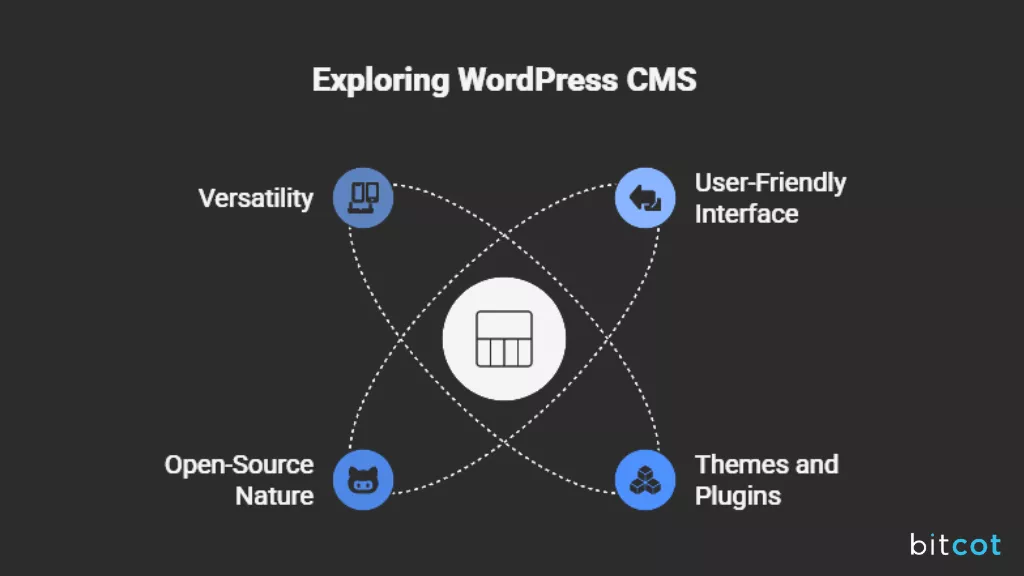
WordPress is a content management system (CMS) that makes it easy to build and manage websites without having to code everything from the ground up.
It started as a simple blogging tool back in 2003, but over the years, it has transformed into a full-scale platform powering everything from personal blogs and portfolios to corporate websites, news platforms, online stores, and membership portals.
Here’s how it works in simple terms: WordPress gives you a dashboard where you can add pages, publish content, upload images, and customize your site’s layout. You can choose from thousands of free and premium themes to design your website and enhance functionality using plugins, like adding payments, booking systems, forms, chatbots, SEO tools, or eCommerce features.
Whether you’re technical or not, WordPress gives you the freedom to create the kind of site you want without major limitations.
Now, fast forward to 2025: why is WordPress still the top choice when so many other platforms exist?
Because it constantly evolves without losing what people love most: flexibility, control, and affordability. Features like the block-based Gutenberg editor, Full Site Editing (FSE), and improved mobile performance make it easier than ever to design and manage websites visually.
Developers appreciate the open-source framework and ability to build custom solutions, while businesses value the scalability and ownership it provides, unlike many closed, subscription-based website builders.
Another major reason for its continued relevance is the massive global community behind it. With regular updates, security improvements, and thousands of contributors developing plugins and themes, WordPress stays modern, secure, and future-ready.
In short, WordPress isn’t just surviving in 2025; it’s still leading the CMS world because it gives users the perfect mix of customization, power, and ease of use, no matter the size or type of website.
Top 8 Reasons to Use WordPress in 2025
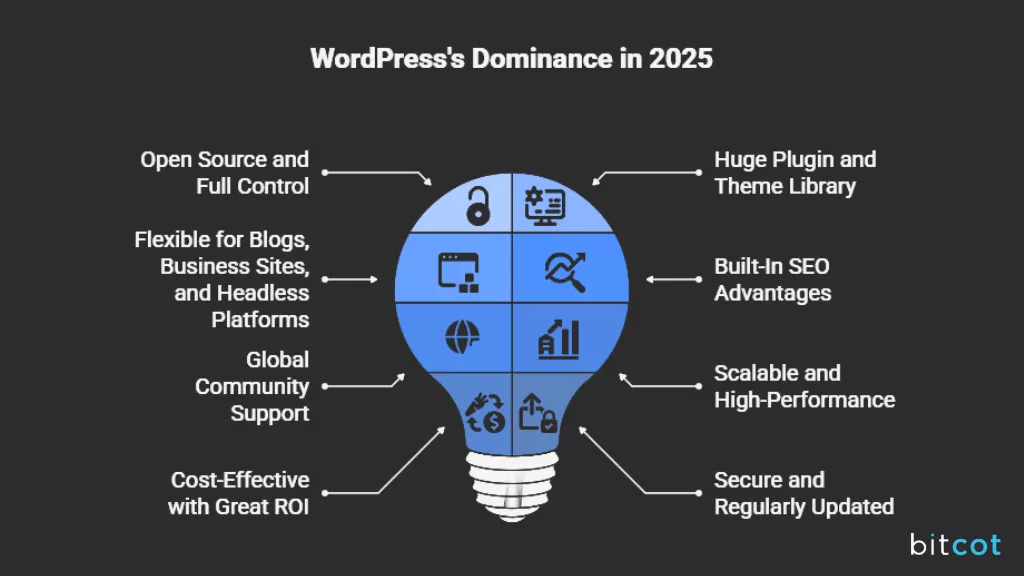
WordPress isn’t just surviving in 2025; it’s thriving. From small blogs to enterprise-grade websites, millions of users worldwide rely on it for a reason.
Here’s why WordPress continues to dominate the CMS landscape:
1. Open Source and Full Control
With WordPress, you have complete ownership of your website. There are no licensing fees, no restrictions, and no platform lock-ins. You control every aspect, from hosting to customization, giving you true freedom to build the site you want.
2. Huge Plugin and Theme Library
WordPress has thousands of plugins and themes to extend functionality and style your site exactly how you want. Need eCommerce features, booking tools, or SEO optimization? There’s almost certainly a plugin ready to help, saving you time and development costs.
3. Flexible for Blogs, Business Sites, and Headless Platforms
Whether you’re starting a simple blog, running a corporate website, or building a headless application with a custom frontend, WordPress scales effortlessly. It’s beginner-friendly yet powerful enough for developers building complex projects.
4. Built-In SEO Advantages
WordPress is designed with search engines in mind. Its clean code, responsive themes, fast loading times, and SEO plugins like Yoast or Rank Math make it easier for your website to rank higher on Google and attract organic traffic.
5. Global Community Support
With millions of users and developers worldwide, WordPress has one of the largest support communities around. Whether you need troubleshooting help, tutorials, or updates, resources are always available, so you’re never building in isolation.
6. Scalable and High-Performance
From personal blogs to enterprise websites handling millions of visitors, WordPress can scale without compromising performance. With caching tools, CDN integrations, and full site editing capabilities, your site can grow seamlessly as your business expands.
7. Cost-Effective with Great ROI
Compared to fully custom solutions, WordPress is extremely cost-efficient. You save on development and maintenance while still getting a professional, fully functional website that can generate measurable results for your business.
8. Secure and Regularly Updated
WordPress prioritizes security with regular core updates, plugins, and themes constantly improving. When combined with best practices and security tools, it offers a robust, protected environment for your website and users.
Real-World Examples: Top Brands Using WordPress in 2025
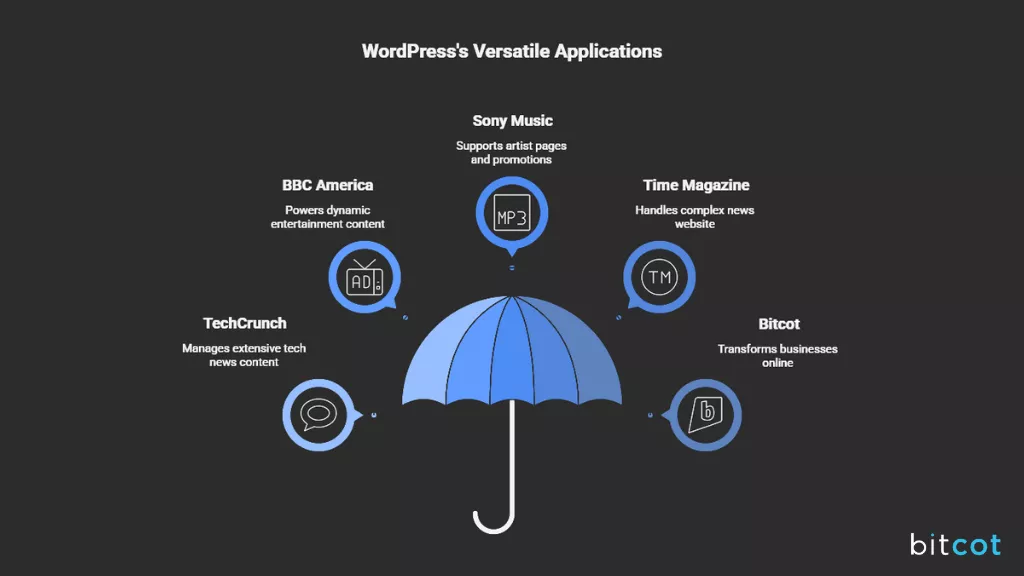
When it comes to choosing a content management system, seeing who else is using it can be a major confidence booster. WordPress isn’t just popular among bloggers or small businesses; it’s the platform behind some of the world’s most recognizable brands.
In 2025, WordPress continues to prove its versatility, scalability, and reliability for enterprises, media outlets, and creative industries alike. Let’s take a closer look at some top brands and notable projects that rely on WordPress to power their online presence.
TechCrunch
TechCrunch, one of the leading technology news websites, runs on WordPress. Managing thousands of articles, multimedia content, and user interactions every day is no small feat, yet WordPress handles it smoothly.
The platform allows TechCrunch’s editorial team to focus on content creation while relying on WordPress for performance, scalability, and SEO. Its plugin ecosystem and customizable design options make it easy to adapt to the fast-paced needs of tech journalism.
BBC America
The entertainment and TV network BBC America leverages WordPress to keep its website fresh and engaging. From show schedules and video content to interactive campaigns and social media integration, WordPress enables the network to present dynamic, responsive content to millions of viewers.
The platform’s flexibility allows BBC America’s digital team to maintain creative freedom without worrying about backend limitations.
Sony Music
Sony Music uses WordPress to power artist pages, promotional campaigns, and interactive content. Whether launching a new album, showcasing artist tours, or creating immersive multimedia experiences, WordPress provides the tools to handle large volumes of content while keeping performance smooth and reliable.
Its scalability ensures that the platform can handle high traffic during album releases or exclusive promotions.
Time Magazine
Time Magazine has relied on WordPress to manage its complex news website. WordPress’s robust architecture supports a combination of articles, multimedia, interactive timelines, and custom features.
For a publication like Time, which constantly updates breaking news and features, WordPress allows the editorial team to work efficiently while maintaining site speed and performance, even under heavy traffic.
Bitcot
At Bitcot, we’ve also seen firsthand how WordPress can transform businesses online. For instance, we redesigned the website for Raphael’s Party Rentals, creating a visually appealing and user-friendly platform that simplifies booking and showcases their services effectively.
Similarly, for Pendolare Gear, we developed a WordPress-based site that balances eCommerce functionality with sleek design, helping the brand engage users and drive sales. These projects highlight how WordPress can meet both creative and business goals, no matter the scale of the operation.
Common WordPress Challenges and How to Overcome Them
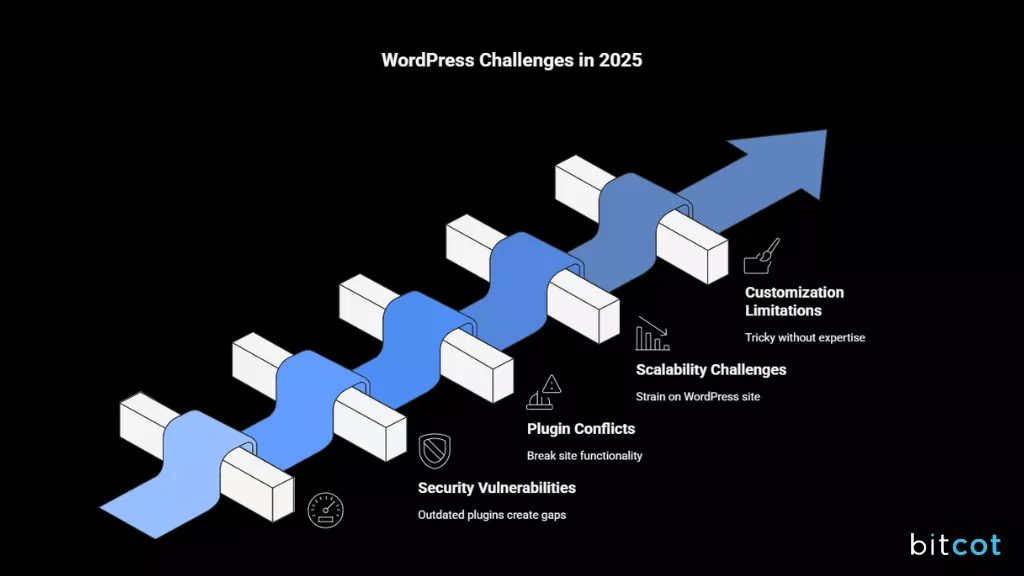
While WordPress is a powerful and flexible CMS, it’s not without its challenges. Understanding common pain points and knowing how to address them can make a big difference in maintaining a smooth, secure, and high-performing website.
Here’s a look at some of the most common WordPress issues in 2025, and practical ways to overcome them.
1. Performance and Speed Issues
As your website grows with more content, images, and plugins, loading times can slow down. To overcome this, use caching solutions like WP Rocket or W3 Total Cache, optimize images with plugins like Smush, and consider a content delivery network (CDN) to serve content faster to global users. Bitcot also helps by performing performance audits and implementing tailored optimization strategies.
2. Security Vulnerabilities
WordPress sites can be vulnerable if not properly maintained. Outdated plugins, themes, or core versions can create security gaps. Regularly updating WordPress, using trusted plugins, and implementing security tools like Wordfence or Sucuri can mitigate risks. At Bitcot, we provide proactive monitoring and security hardening services, keeping your site safe from potential threats.
3. Plugin Conflicts and Management
With thousands of plugins available, it’s easy to run into conflicts that can break site functionality. The solution is to carefully vet plugins before installation, keep them updated, and remove those you no longer need. Bitcot’s team ensures that only compatible and essential plugins are used, minimizing conflicts while maintaining functionality.
4. Scalability Challenges
Growing traffic and expanding features can strain a WordPress site if it wasn’t set up for scalability from the start. Implementing scalable hosting solutions, database optimization, and performance-focused themes can help. Bitcot assists clients in planning and executing scalable WordPress architectures, so your site grows seamlessly with your business.
5. Design and Customization Limitations
While WordPress offers great themes and page builders, sometimes businesses require highly customized designs. This can be tricky without technical expertise. Bitcot helps by developing custom themes and integrating advanced page-building tools, giving you complete control over your website’s look and feel.
WordPress vs Other CMS Platforms: A Quick Comparison
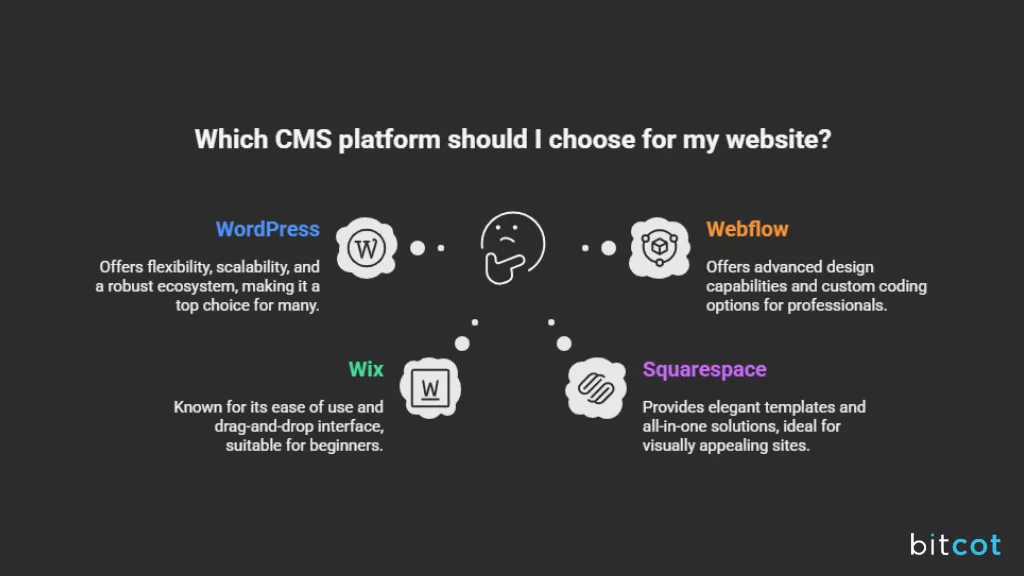
Choosing the right content management system (CMS) is a critical step in building your website.
While there are many options available, like Wix, Squarespace, and Webflow, WordPress continues to stand out in 2025 for its flexibility, scalability, and robust ecosystem.
Let’s take a look at how WordPress compares to these popular platforms.
Why Compare?
Each CMS has its strengths, but businesses and developers often need to weigh control, customization, cost, and scalability. WordPress provides a unique combination of power and flexibility that many other platforms can’t match, especially for larger websites or projects requiring advanced functionality.
Here’s a quick side-by-side comparison:
| Feature/Platform | WordPress | Wix | Squarespace | Webflow |
| Ease of Use | Moderate (requires learning) | Very easy (drag-and-drop) | Easy (drag-and-drop) | Moderate (visual editor, learning curve) |
| Customization | Highly customizable via plugins, themes, and custom code | Limited to built-in features | Moderate customization, limited code access | High customization with CSS/JS, but more technical |
| Cost | Free core, hosting & premium plugins may cost | Paid plans, hosting included | Paid plans, hosting included | Paid plans, hosting included |
| Scalability | Excellent for small to enterprise-level sites | Limited for large/complex sites | Limited for high-traffic or complex sites | Good, but complex sites require technical expertise |
| SEO & Marketing | Excellent with SEO plugins and tools | Basic SEO tools | Basic SEO tools | Strong SEO capabilities |
| Community & Support | Massive global community, extensive resources | Smaller support community | Smaller support community | Moderate support community |
| E-commerce Capability | Excellent via WooCommerce or other plugins | Good, limited compared to WordPress | Good, but less flexible | Strong for custom eCommerce but technical |
Key Takeaways:
- WordPress offers the most flexibility and scalability, making it ideal for businesses, startups, and enterprises that want full control.
- Wix and Squarespace are great for beginners or small businesses looking for quick, no-code solutions, but can be limiting for growth.
- Webflow appeals to designers who want more control over visuals and interactions, but it requires more technical expertise.
Ultimately, WordPress provides the perfect balance of ease-of-use, customization, and long-term scalability. Whether you’re starting a blog, building an eCommerce store, or creating an enterprise-level website, WordPress remains a reliable, future-ready choice in 2025.
How Bitcot Can Help You Build a Custom WordPress Website
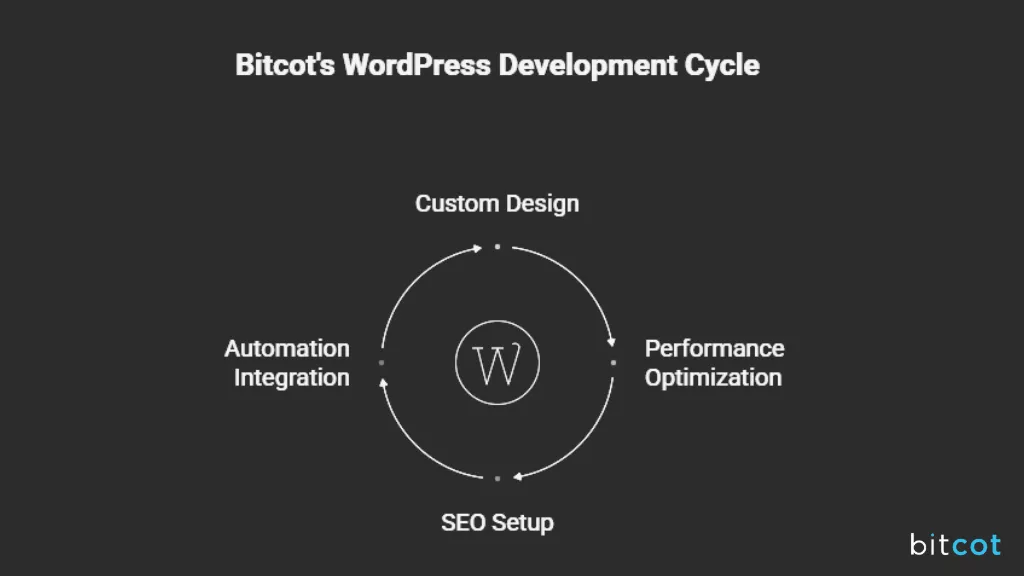
Building a WordPress website that truly stands out requires more than just installing a theme; it’s about creating a seamless, high-performing, and scalable platform tailored to your business goals.
That’s where Bitcot comes in.
With years of expertise in WordPress development, we help businesses of all sizes leverage the full potential of the platform.
Custom WordPress Design and Development
At Bitcot, we don’t believe in one-size-fits-all solutions. Our team designs and develops fully customized WordPress websites that align with your brand identity and business objectives. Whether you need a sleek corporate website, a dynamic eCommerce platform, or a feature-rich blog, we build sites that are visually engaging and technically robust.
Speed and Performance Optimization
A slow website can drive visitors away. Bitcot ensures your WordPress site loads quickly and performs flawlessly. From caching and image optimization to database tuning and server setup, we implement the best practices that keep your website fast and responsive, even under heavy traffic.
SEO Setup and Optimization
A beautiful website is only effective if people can find it. Bitcot integrates SEO-friendly structures, meta configurations, and essential plugins to give your website the best chance to rank high on search engines. Our team also guides you on content strategy and technical SEO to maximize organic traffic.
Automation and Workflow Integration
Modern websites benefit from smart automation. We help integrate WordPress with tools like CRMs, marketing automation platforms, and payment gateways to streamline operations and improve user experience. From form automation to automated email workflows, Bitcot ensures your site works smarter, not harder.
Why Choose Bitcot?
With Bitcot, you get a partner who understands both the technical and business sides of WordPress. We focus on delivering a site that looks great, performs seamlessly, and drives results for your business.
Ready to elevate your online presence with a custom WordPress website? Schedule a consultation and see how we can bring your vision to life.
Final Thoughts
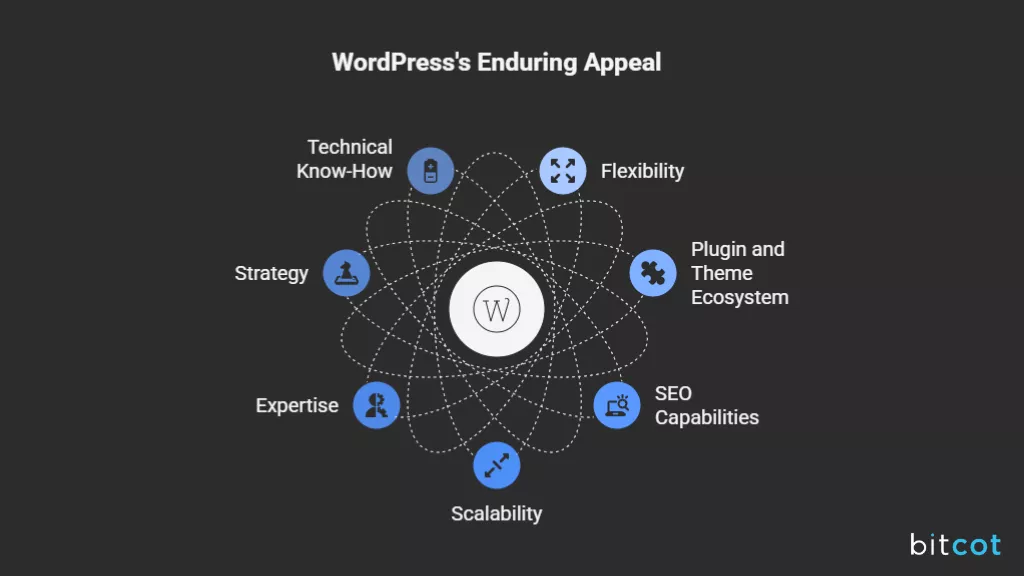
WordPress has stood the test of time, and in 2025, it remains the go-to CMS for businesses, creators, and developers worldwide. Its unmatched flexibility, extensive plugin and theme ecosystem, strong SEO capabilities, and scalability make it a platform that can grow with your business.
Whether you’re launching a personal blog, building a corporate website, or managing a high-traffic enterprise platform, WordPress provides the tools and freedom to make it happen.
However, unlocking the full potential of WordPress requires expertise, strategy, and technical know-how.
From custom design and development to speed optimization, SEO setup, and automation integration, we help businesses build WordPress websites that are not only visually stunning but also high-performing and future-ready.
If you want a website that drives results, scales with your business, and reflects your brand’s unique identity, partner with Bitcot for custom WordPress development services and turn your WordPress vision into reality.
Get in touch with our team.
Frequently Asked Questions
1. Is WordPress suitable for enterprise or large websites?
Yes, WordPress is highly scalable and can support websites of any size, from small blogs to enterprise platforms with millions of visitors. Proper hosting, caching, and optimization allow large websites to maintain fast performance. Many global brands, including media outlets and corporate sites, rely on WordPress for its flexibility and reliability, making it a trusted choice for businesses that need growth.
2. How secure is WordPress today?
WordPress is secure when managed correctly. Keeping the core, themes, and plugins updated regularly reduces vulnerabilities, while security plugins like Wordfence or Sucuri add extra protection. Bitcot also provides proactive monitoring, vulnerability assessments, and best-practice hardening to ensure your website stays safe from hackers and cyber threats without compromising performance.
3. What are the best WordPress plugins for businesses?
The best plugins depend on your business goals. For SEO, tools like Yoast SEO or Rank Math help optimize content, while WooCommerce powers eCommerce functionality. WPForms or Gravity Forms handle lead capture and forms, and UpdraftPlus manages backups. WP Rocket enhances performance. Bitcot helps businesses choose and integrate plugins carefully, ensuring smooth functionality.
4. How much does it cost to build a WordPress site in 2025?
Costs vary depending on website complexity, design, and features. A simple blog or portfolio might cost a few hundred dollars, while custom business websites or enterprise platforms with advanced functionality typically range from $5,000 to $50,000 or more. Bitcot provides tailored estimates, helping you plan a cost-effective project that delivers the best ROI while ensuring your site is scalable.
5. Can I use WordPress headlessly with React or Next.js?
Yes, WordPress works well as a headless CMS, delivering content through REST API or GraphQL endpoints while your frontend is built in frameworks like React or Next.js. This allows for highly dynamic, modern websites with fast load times and smooth interactions. Bitcot builds headless solutions that combine the best of content management with modern frontend technologies.
6. Do I need to know PHP to use WordPress?
No, PHP knowledge is not required to manage content, use page builders, or run a standard WordPress site. Beginners can build and maintain fully functional websites without touching code. However, understanding PHP can help if you want to create custom features, modify themes deeply, or integrate advanced functionality. Bitcot provides full development support for businesses.
7. Is WordPress still good for SEO in 2025?
Yes, WordPress remains one of the most SEO-friendly CMS platforms. Its clean code, responsive designs, fast performance, and SEO plugins like Yoast SEO make it easy to optimize websites for search engines. Regular updates and support from a global community keep WordPress competitive. Bitcot also helps businesses implement technical SEO best practices and content strategies.




